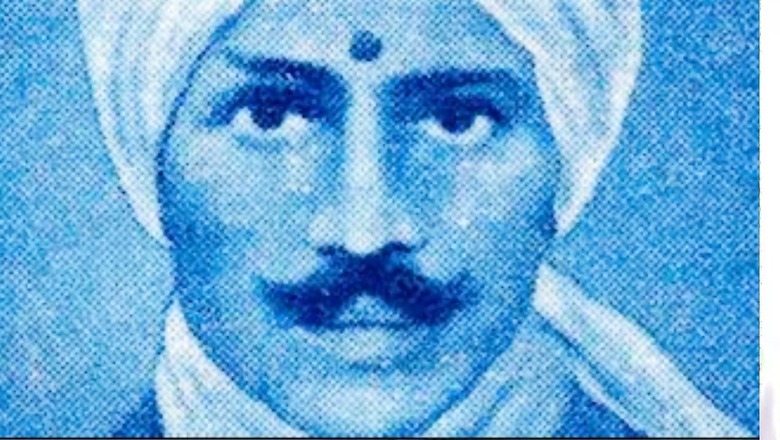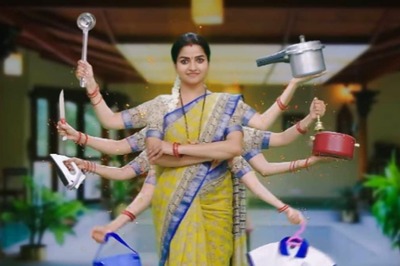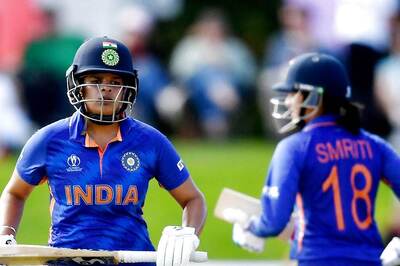
views
When C. Subramania Bharati died exactly 100 years ago, on September 11, 1921, he was only 38 years old – by any reasonable definition, still a young man. In his own way, Bharati was enamored of youth, but not at all in the sense in which today’s media culture is said to be youth obsessed. It wasn’t physiological youth that especially interested him. Rather, he was fascinated by the characteristic qualities of the young – fire, passion, fearlessness, delight – and his writing, in his native Tamil and in all other languages that he touched, reflects these qualities of youthful intelligence.
Indeed, this is as simple and straightforward an explanation as any of why his work has survived for a full century, and why interest in it shows no sign of ebbing. Bharati knew that he was a poet at heart very early in his life – by age 7, he was already writing poetry that was admired by the Tamil scholars in the court of the Ettayapuram Maharaja, who bestowed upon him the title of “Bharati” in recognition of his precocious literary talent. But building outward from this profoundly sensitive and sophisticated spiritual core, he would go on to do many kinds of writing in his life, and to write successfully in multiple languages.
Bharati’s versatility as a writer and polyglot is perhaps not always as well remembered as it should be. It reflects the astonishing calibre of his genius and deserves our utmost admiration. His learning encompassed numerous Indian languages, including Sanskrit and Hindi, and he also acquired familiarity with at least one Continental European language, French, during his time in Pondicherry. A devotee of Tamil, and a true poet, he was simply in love with language in all its forms. He was intrigued by the diversity of languages that he encountered. Considering this background, it now seems highly appropriate that a Chair in Tamil studies has been endowed in his name at Banaras Hindu University on the occasion of his 100th death anniversary, in India’s Hindi heartland and the city that helped to form his character in his youth.
In English, a language in which he produced substantial material, his skill was enormous. The primary exercise of his talent (though not the only one) was the writing of journalism. Bharati worked throughout his brief life as a journalist, writing in both Tamil and English, commenting extensively on Indian and world affairs, and offering important critiques of everything that he saw. Through his activities as a journalist, he learned about current affairs and applied his creative genius to communicating the essence of what he witnessed in simple and accessible prose.
The personalities of the national movement, from across the country, fascinated him. He wrote not only journalistic pieces but also poems about key figures in the movement like Tilak and Gokhale, VO Chidambaram Pillai and, eventually, Mahatma Gandhi. He also wrote poems on world events like the Russian Revolution of 1917, describing the fall of the Tsar as akin to the collapse of the Himalayas; and essays and commentary about the onset of World War I and India’s attitude of “generosity and magnanimity” faced with this unprecedented conflict.
Like many writers, Bharati received invaluable intellectual and professional training through his journalism. His writing in English, in particular, is the focus of a new book, The Coming Age, published as a Penguin Modern Classic in commemoration of his death centenary. It shows how Bharati mastered the art of concise and pithy communication in English through journalism, much of it critical in spirit, and how he was then able to extend that skill into startling new areas of inquiry, sometimes with astonishing results. He brought to bear the same simplicity of language and direct approach with which he treated current affairs upon the great diversity of his intellectual concerns.
It seems that there was practically no subject which failed to arouse Bharati’s congenital writerly curiosity. His English writings present a veritable microcosm of his Tamil work, in the sense that they cover a seemingly limitless range of subjects and ideas, revealing an urbane and sophisticated intelligence at play. He writes about Indian culture, Indian languages, and cultural traditions, from the Sanskrit study of the Vedas to the women’s folk dance known in Tamil Nadu as the “Kummi.” His own daughter was said to be a beautiful Kummi dancer. He explores Vedic mysticism and Nietzschean philosophy, English Romantic poetry and Tamil classics, offering his own peerless translations of poems that he admired from the ancient Tamil poets Nachiar and Nammalwar. He writes about science and was fascinated by the great innovations of pioneering Indian scientist Jagdish Chandra Bhose. Many of these articles and translations were placed in English language magazines run by fellow nationalists from other parts of India, including Annie Besant and Aurobindo Ghose.
This experience of the world played upon the sensitive, refined heart of the young poet like the hand of a master musician stroking a sitar. His English articles return repeatedly to the social issues that preoccupied him, and, in particular, to the great “evil,” as he fearlessly and repeatedly labels it, of discrimination. His thinking about these issues reveals a deeply compassionate nature that has acquired the tools of reason and uses them with great precision to explain what it sees as the inevitable requirements of justice and truth. Since caste discrimination must be destroyed, let us eat together, and let us marry across caste lines: these are the only solutions that can truly eliminate this social evil, he writes. Since women are the equals – nay, betters! – of men, let us assure their education, and ask them to write our laws and lead our society.
Since all human beings are equal, he wrote in English, let Indians be free of British constraints on their human rights. Pointedly, addressing himself directly to the British, he invokes the quintessentially British value of freedom of speech and asks, with disarming simplicity, why it is that freedom of speech is lauded in Britain but openly disregarded by the British administration when they operate in India. Questions like these could not be answered; the conduct that they exposed was inimical to truth. British hypocrisy of the time was laid bare, in all its ugliness, by the clear light of Bharati’s prescient and powerful words.
Exactly a century after his death, Bharati is held up as a hero for his role in the freedom struggle. But his contribution lay not only in the fight against the injustices of the British administration in India, something that he carried on tirelessly, with enormous patience and intelligence. Just as importantly, his writing in both Tamil and English sought to restore a sense of self-worth to Indians as the scions of a rich and ancient culture as great as any the world has known. Above all, the values promoted by that culture reflected extraordinary human development. Cultural and human diversity were the essence of the Motherland as Bharati knew and loved her. He believed that the preeminent values of truth, dignity, and individual integrity that were repeatedly reaffirmed throughout Indian history presented a powerful antidote to the strident cruelty of an early 20th century world order dominated by a painfully disintegrating Europe. This is why Bharati is not only admired today, but also revered, and loved. He gave voice to those who had no voice, restoring a sense of self-worth and dignity to his fellow Indians, and, indeed, to all those who came into contact with his words.
In all of this, Bharati was a revolutionary. Nothing short of an ideal world was acceptable to him, and his definition of such a world, as he saw it, was actually quite simple. It would be a world without human oppression, allowing, instead, the flourishing of beauty in all its forms as mandated by nature – including the structures of human society. His writings will always represent this particular brand of revolution, and his powerful words will always ignite change – in the hearts of individuals, in communities, in nations, and in civilisations.
It is therefore no surprise that Bharati’s visionary words have stood the test of time, or why they continue to be relevant today. While the world has moved forward since Bharati’s time, we still remain far from achieving the kind of society that the poet envisioned. In continuing to work towards those goals today, Bharati remains our faithful and trustworthy guide.
In his revolutionary mission, Bharati particularly addressed himself to the “youth” of his times. He was deeply concerned that previous generations had lost their “imagination,” “For the imagination,” he writes “—not that of the idler and the dreamy parasite, but the vigorous and positive imagination of the worker ‘the vision of a higher and nobler life’—this imagination is the mother of a Nation’s hope—this imagination makes a nation’s seers, its poets, and its builders of all types.
“This imagination is the way to immortality, the ladder that man climbs to arrive at divinity.”
He exhorted the youth of his times: “Imagine yourselves as noble and godly. And act on this imagination.”
Bharati’s immortal words continue to speak to today’s “youth” – to the young, and to all those of every age who strive tirelessly towards a better and more beautiful world. They are the true keepers of Bharati’s legacy, and his true heirs.
(The views expressed in this article are those of the author and do not represent the stand of this publication.)
Read all minute-by-minute news updates for Uttar Pradesh election results 2022, Punjab election results 2022, Uttarakhand election results 2022, Manipur election results 2022, and Goa election results 2022.
Click here for seat-wise LIVE result updates.















Comments
0 comment